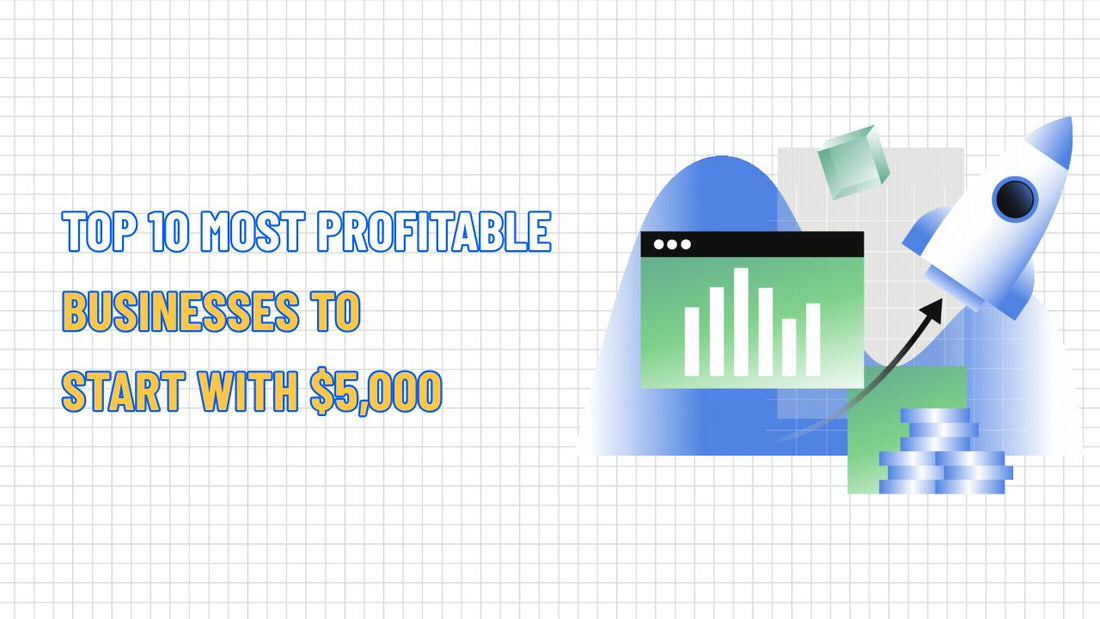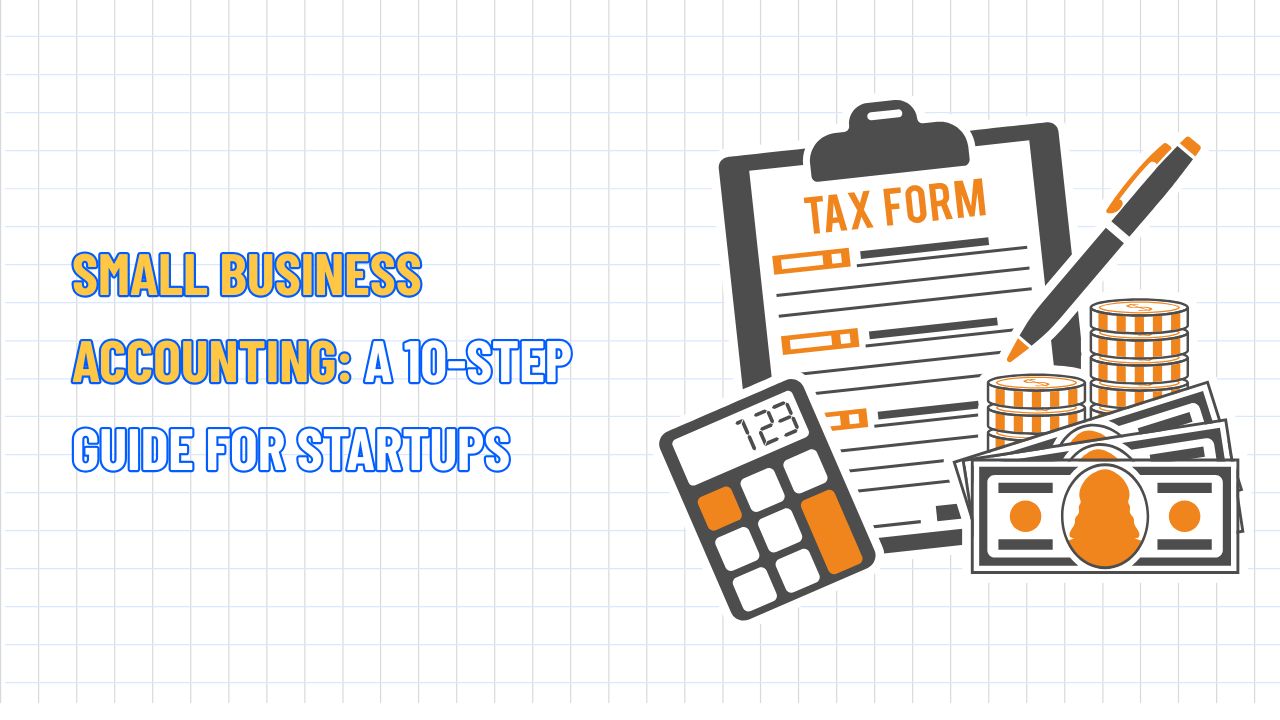Top 10 Most Profitable Businesses to Start with $5,000
Table of Contents Hide
Starting a business with just $5,000 is not only feasible but also a strategic way to enter the entrepreneurial path with minimal risk. In this article, let's explore with NextSky the 10 most successful business ideas that you can start with $5,000, providing practical information, detailed costs, and revenue potential.
Top 10 businesses to start with $5,000
1. Virtual assistant services
Become a virtual assistant, providing remote administrative, technical, or creative support to businesses and entrepreneurs. Services include email management, scheduling, social media posting, basic graphic design, or customer support. Specialize in a niche and leverage platforms like Upwork or Fiverr to find clients.

Startup costs:
- Laptop/computer (existing or used): $0–$1,000
- High-speed internet: $50–$100/month
- Software (Google Workspace, Zoom, Canva Pro): $30–$100/month
- Website & domain: $50–$150/year
- Marketing (social media ads, LinkedIn): $200–$500
- Business registration & insurance: $100–$300
- Contingency fund: $500–$1,000
- Total estimated capital: $1,030–$3,050
Estimated revenue:
- Basic virtual assistant: $15–$25/hour ($2,400–$4,000/month full-time)
- Specialized virtual assistant (e.g., technical, social media): $25–$50/hour ($4,000–$8,000/month)
- Fixed service packages: $500–$2,000/client/month
- ROI potential: High, positive cash flow in 1–3 months
Success tips:
- Specialize in a niche like e-commerce or real estate support.
- Use free tools like Canva for initial marketing materials.
- Network via LinkedIn or local business groups to find clients.
Read more: How to Start a Business in 14 Simple Steps to Success
2. Mobile car wash services
Offer on-site car cleaning and detailing for busy professionals, car enthusiasts, or families. This mobile model eliminates shop rental costs, allowing you to bring services directly to customers. Focus on quality and convenience to build a loyal client base.
Startup costs:
- Cleaning supplies (vacuum, cleaners, wax): $500–$1,000
- Water tank & pressure washer: $500–$1,500
- Transportation (existing vehicle): $100–$300/month (fuel)
- Liability insurance: $400–$800/year
- Marketing (website, flyers, social ads): $300–$700
- Business registration: $100–$300
- Contingency fund: $500
- Total estimated capital: $1,900–$4,600
Estimated revenue:
- Per vehicle: $100–$250
- Weekly clients: $400–$1,000/client/month
- Solo operator: $3,000–$7,000/month
- ROI potential: High, breakeven in 2–4 months
Success tips:
- Offer recurring subscription packages (e.g., biweekly washes).
- Target upscale residential areas or corporate offices.
- Post before/after photos on Instagram to attract clients.
3. Social media management for small businesses
Start a service to help shops, restaurants, and small businesses with professional social media content and visuals. Use free tools like Canva or Meta Business Suite to keep costs low and deliver high impact.

Startup costs:
- Laptop/computer (existing): $0–$1,000
- Software (Canva Pro, Buffer, Adobe Express): $50–$150/month
- Website & portfolio: $200–$500
- Marketing (local outreach, ads): $300–$800
- Business registration: $50–$150
- Contingency fund: $500
- Total estimated capital: $1,100–$3,600
Estimated revenue:
- Basic management package: $500–$1,500/client/month
- Add-on services (ad management): $200–$500/client/month
- With 3–5 clients: $1,500–$7,500/month
- ROI potential: High, profitable in 2–4 months
Success tips:
- Focus on a niche like restaurants or retail for tailored services.
- Use Meta Business Suite to minimize initial costs.
- Share case studies to demonstrate results.
4. Print-on-demand store
Launch an online business selling custom products like t-shirts, mugs, or posters through platforms like Printful or Teespring. With this model, you don’t need to manage inventory, as products are printed and shipped directly to customers after orders.
Startup costs:
- Design software (Canva Pro, Adobe): $20–$100/month
- Shopify plan: $29–$79/month
- Domain & website: $50–$150/year
- Marketing (social media ads, influencer collabs): $500–$1,500
- Initial designs (freelance or self-made): $200–$500
- Business registration: $50–$200
- Contingency fund: $300
- Total estimated capital: $1,149–$3,529
Estimated revenue:
- Product price: $15–$50 (50–70% profit margin)
- Monthly sales (100–300 products): $1,500–$15,000
- ROI potential: Profitable in 3–6 months with effective marketing
Success tips:
- Target trending niches like pet lovers or fitness enthusiasts.
- Use TikTok and Pinterest for low-cost marketing.
- Test designs with a small ad budget before scaling.
Read more: How To Build Print-On-Demand Shopify Store From The Ground Up
5. Home repair services
Offer essential small home repairs like patching drywall, assembling furniture, fixing doors, or repainting. This convenient service keeps living spaces in top shape.

Startup costs:
- Tool kit (drill, saw, wrenches, etc.): $800–$1,500
- Liability insurance: $800–$1,500/year
- Transportation (existing vehicle): $100–$300/month (fuel)
- Marketing (website, flyers, Nextdoor ads): $500–$1,000
- Business registration: $150–$300
- Initial materials: $200
- Total estimated capital: $2,350–$4,600
Estimated revenue:
- Hourly rate: $50–$80
- Average job: $150–$400
- Solo operator: $4,000–$8,000/month
- ROI potential: High, positive cash flow in 1–2 months
Success tips:
- Start with small jobs to build reputation.
- Use local apps like Nextdoor to find clients.
- Offer bundled services to increase job value.
Read more: 27 Attractive Green Business Ideas for Entrepreneurs
6. Wedding backdrop & frame rentals
Weddings are a lucrative market, with clients willing to pay for unique, memorable experiences. This model requires a one-time investment for reusable rentals, turning each event into sustainable profit.
Startup costs:
- Backdrops/frames (2 sets): $500–$1,500
- Fabric/artificial flowers: $300–$800
- Transportation (trailer rental): $50–$100/job
- Storage: $100–$200/month
- Liability insurance: $500–$800/year
- Marketing (social media, WeddingWire): $300–$700
- Professional photography: $300–$800
- Total estimated capital: $1,750–$4,100
Estimated revenue:
- Per rental: $150–$500/weekend
- Delivery/setup fee: $50–$150
- Monthly revenue (peak season): $2,500–$8,000
- ROI potential: Breakeven in 5–10 rentals
Success tips:
- Invest in eye-catching, durable designs.
- Partner with wedding planners for referrals.
- Use Instagram to showcase event setups.
7. Microgreens business
Growing and selling microgreens connects you with restaurants, farmers’ markets, or consumers through online stores. This flexible, home-based business is accessible and scalable.

Startup costs:
- Seeds & growing supplies: $500–$1,000
- Grow lights/trays: $500–$1,200
- Website & domain: $50–$150/year
- Marketing (farmers’ markets, social ads): $300–$700
- Business registration: $50–$200
- Contingency fund: $200
- Total estimated capital: $1,400–$3,250
Estimated revenue:
- Per pound: $50–$100
- Weekly sales (10–20 pounds): $500–$2,000
- Monthly revenue: $2,000–$8,000
- ROI potential: Profitable in 2–4 months
Success tips:
- Target local restaurants or health food stores.
- Offer subscription boxes for recurring revenue.
- Use social media to educate customers on microgreens’ benefits.
8. Resume & LinkedIn optimization
In a competitive job market, resume and LinkedIn optimization services give candidates an edge. Help clients stand out to recruiters with professional, impactful personal brands.
Startup costs:
- Laptop/computer (existing): $0–$1,000
- Software (Grammarly, Canva): $20–$50/month
- Website & portfolio: $200–$500
- Marketing (LinkedIn ads, job boards): $300–$700
- Business registration: $50–$150
- Contingency fund: $500
- Total estimated capital: $1,070–$3,400
Estimated revenue:
- Per service package: $200–$500
- Monthly clients (5–10): $1,000–$5,000
- ROI potential: Profitable in 1–3 months
Success tips:
- Offer tiered packages (e.g., resume-only or full personal branding).
- Build a portfolio with anonymized before/after examples.
- Partner with career coaches for referrals.
9. Bounce house rentals
Provide bounce houses for kids’ parties and events, offering safe, colorful entertainment. This flexible model can expand into full party planning services, meeting diverse client needs.
Startup costs:
- Commercial bounce house: $1,500–$3,000
- Blower & cleaning supplies: $200–$400
- Liability insurance: $1,000–$2,000/year
- Transportation (trailer): $500–$1,500
- Marketing (website, social ads): $500–$1,000
- Contingency fund: $500
- Total estimated capital: $3,700–$7,900
Estimated revenue:
- Per rental: $150–$350/day
- Weekend revenue (1 bounce house): $300–$700
- Monthly revenue (peak season): $2,000–$6,000
- ROI potential: Breakeven in 10–20 rentals
Success tips:
- Prioritize safety with regular cleaning and inspections.
- Target community events and schools for bulk bookings.
- Use vibrant social media visuals to attract clients.
Offer specialized online consulting in healthcare fields like mental health, nutrition, or chronic disease management through platforms like Bask Health. This provides convenient, high-quality care from home.
Startup costs:
- Certifications (if needed): $500–$1,000
- Telehealth platform subscription: $50–$200/month
- Website & domain: $50–$150/year
- Marketing (SEO, partnerships): $500–$1,000
- Liability insurance: $200–$500/year
- Business registration: $50–$150
- Contingency fund: $200
- Total estimated capital: $1,350–$3,000
Estimated revenue:
- Per consultation: $80–$150
- Weekly sessions (15–20): $1,200–$3,000
- Monthly revenue: $4,800–$12,000
- ROI potential: Profitable in 2–4 months
Success tips:
- Ensure HIPAA compliance and state licensing.
- Partner with platforms like Bask Health for efficient operations.
- Market to underserved areas or niche patient groups.
Why start a business with $5,000?
A $5,000 budget forces you to operate efficiently and creatively, aligning with lean startup principles. By focusing on low-cost models, you can test markets quickly, minimize financial risks, and scale strategically. The businesses above are chosen for their low startup costs, high profit margins, and alignment with growing industries. Each idea is designed to deliver value to customers while ensuring a high ROI.
- Low financial risk: A small budget minimizes exposure compared to high-capital ventures.
- Scalability: Many of these businesses can grow from solo operations to teams or passive income streams.
- Market fit: These ideas meet 2025 demands for digital solutions, local services, and niche markets.
- Leverage skills: Most rely on existing skills or affordable training, making them accessible.
How to succeed with a $5,000 business
Calculate ROI for smart decisions
Track all costs and revenue streams to ensure profitability:
- Formula: ROI = (Net Profit / Total Investment) × 100
- Example: $3,000 net profit from a $5,000 investment = 60% ROI.
- Aim for positive ROI within 6–12 months by focusing on high-margin services or products.
Leverage free marketing
- Social media: Use Instagram, TikTok, and LinkedIn to share before/after photos, testimonials, or educational content.
- Local outreach: Join community boards, Nextdoor, or local business groups.
- Partnerships: Collaborate with complementary businesses (e.g., wedding planners for rental services).
Scale strategically
- Systemize: Document processes for consistency (e.g., client onboarding, service delivery).
- Hire smartly: Start with part-time contractors for overflow work.
- Reinvest profits: Upgrade equipment or marketing once demand is proven.
Consider acquiring existing businesses
Instead of starting from scratch, explore seller-financed businesses like cleaning routes or vending machine operations. Benefits include:
- Existing customer base and cash flow.
- Proven model with less trial and error.
- Initial payments within a $5,000 budget.
A $5,000 budget is more than enough to launch a profitable business in 2025. Whether you choose a digital venture like a print-on-demand store or a local service like mobile car washing, success lies in execution. Pick an idea that matches your skills, research the market, and take action. With dedication and a smart plan, your small investment can grow into a sustainable, high-profit business.










